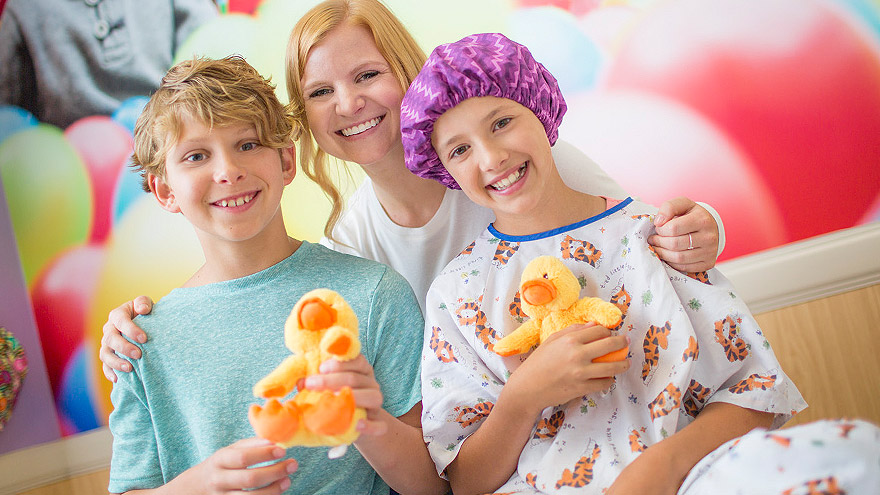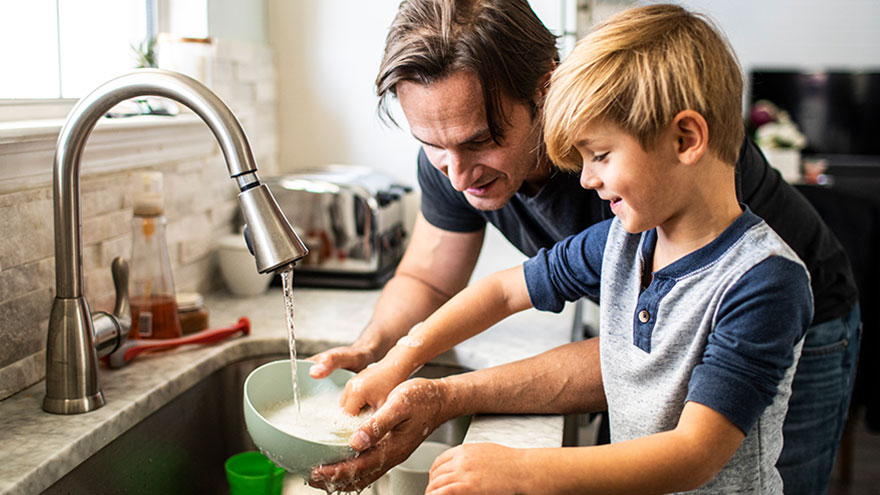Search
-
What Is the Role of a Child Life Specialist?
What is the role of the child life specialist? Here are common questions and answers about how these special individuals give both parents and kids peace of mind. Let’s face it: A hospital can be an intimidating place for just about anyone. But add in being a small human with very little worldly experience — aka a child — and it’s easy to imagine how overwhelming a hospital visit can be. Enter the role of the child life specialist. Liz Winkler, a child life specialist with Renown Children’s Hospital, explains how a Renown program puts young patients and their families at ease. What does a child life specialist do? Child life specialists help young patients develop ways to cope with the anxiety, fear and separation that often accompany the hospital experience. They give special consideration to each child’s family, culture and stage of development. As professionals trained to work with children in medical settings, specialists hold a bachelor’s or master’s degree in the areas of child life, child development and special education or recreational therapy. Our child life specialists are also professionally certified and affiliated with the national Child Life Council. Child life specialists also offer tours of Renown Children’s Hospital for families whose children are scheduled to have surgery. Child life supports children and families by: Helping children cope with anxiety, fear, separation and adjustment Making doctors, needles and tests a little less scary Providing art, music and pet therapy Organizing activities Addressing your concerns Telling you what to expect Creating a therapeutic and medical plan Offering a hand to hold What else is available at the Children’s Hospital that helps ease some of the stress of a hospital visit? Whether it’s seeing a pediatrician, getting a sports physical or looking for advice, our care is centered on supporting and nurturing patients and families at our many locations. We have kid-friendly environments to help ease some of the stress of a hospital visit. These include colorful exam rooms, kid-friendly waiting and common areas, and medical equipment designed especially for children. Our children’s ER is open 24 hours a day, seven days a week. So parents and caregivers have access to emergency care tailored to little ones — anytime, day or night. We have several pediatric specialists on the Renown team in areas including diabetes, emergency medicine, neurology, pulmonology, blood diseases and cancer. How can parents start to ease their children’s mind when they know a hospital visit is in the future? As with many things in life, good preparation can help kids feel less anxious about the experience and even get through recovery faster. It’s important to provide information at your child’s level of understanding, while correcting any misunderstandings, and helping to eliminate fears and feelings of guilt. If you’re anxious and nervous, your child may reflect these feelings and behaviors. So make sure you educate yourself, feel comfortable with the process, and get your questions answered.
Read More About What Is the Role of a Child Life Specialist?
-
Healthy Aging 5 Tips to Improve Happiness and Quality of Life
There are a few simple ways to encourage healthy aging that can translate to an improved quality of life. Here are some expert tips. What does healthy aging mean to you? If you’re like most people, you’re looking forward to removing the negative from your life — negative energy, thoughts, people and activities that don’t contribute to your best life. And while that’s a noble goal, too often we forget about ways to strengthen the positive parts of our lives. Expert Herbert “Buddy” Coard III, Ed.D, psychologist with Renown Behavioral Health, provides us with five positive behaviors to focus on to improve happiness and life satisfaction. Healthy Aging in 5 Easy Steps: 1. Connect – Make connections with friends, family, colleagues and neighbors. When you build strong connections, they can help enrich your life with new experiences and opportunities. Besides, having a support system to call upon when you need a favor is valuable as you age. 2. Be Active – Make time to get moving and work those muscles. Being active can include walking, practicing yoga, playing a game of pickleball or dancing. Exercise makes you feel good and keeps you health. Pick a physical activity that you enjoy, and don’t make excuses. Not only will being active help you build stronger muscles, it also helps you build strong connections with others. If you need a workout buddy, Meetup is a great resource to find like-minded people that share common exercise goals. 3. Take Notice – Be mindful and become more curious. Like a child, see the wonder and beauty of the world. Notice the things around you — the weather, the landscape, the mood and feelings of the people around you. By taking notice, it’s easier to learn to appreciate the things that matter. 4. Keep Learning – We never stop learning. Keep trying something new — a new course you’ve always wanted to try or a more challenging task someone has solicited for your help. Challenges keep us on our toes and increase our confidence and excitement in our day. OLLI (Osher Lifelong Learning Institute at the University of Nevada, Reno), brings diverse educational and social opportunities to active older adult learners (50+). EPIC (Educational Programs Inspiring the Community), offers a divers curriculum ranging from art classes to Accelerated training certificate courses. 5. Give – Be generous with your time, your knowledge and your talents by giving to friends, family and even strangers. Some easy ways to give is to show thankfulness, smile at people and volunteer. Sharing of yourself to a wider audience gives you a greater reward than just doing things for yourself. Nevada Volunteers Volunteer at Renown Health Practice these five tips to improve happiness and quality of life at any age.
Read More About Healthy Aging 5 Tips to Improve Happiness and Quality of Life
-
Bye-Bye Holidays, Hello Routines! Getting Kids Back into the Groove
The kids are back in school and the holidays are all but a distant memory: Now what? Karen Wagner, APRN, offers specific tips about getting kids back to their routines in the post-holiday-hustle-and-bustle. Are you finding the kids struggling with bedtime routines? Having trouble getting them to tackle homework? There’s a simple reason: The holidays messed with their mojo! Here, we talk with Nurse Practitioner Karen Wagner about what to do to get them back on the straight and narrow. Why Routines Are Important “Holidays are a fantastic time to get together with family and friends, so our routines are usually off — and this is understandable, “Wagner says. “While the holidays are exciting, they are chaotic and can put our kids out of the routines.” So how do you get kids back into those routines they crave? “Consistency/routines are crucial for our kids,” she says. “Most people — kids and adults — experience a let-down feeling after the holidays, and post-holiday adjustment takes time.” So what can we do, specifically? Wagner recommends the following: Re-establish family routines, including before- and after-school programs or child care routines. Once kids are back on the regular schedule, they’ll find that sense of familiarity as the old routine returns. But keep in mind, this won’t happen overnight. Encourage healthy eating, as the upheaval of their schedule can be offset by a balanced diet. Make sleep time a priority: Keep in mind that it might take up to three nights of strict bedtime to get them back on track. But enforcing normal bedtime will get their bodies back on a normal schedule. Return to usual chores and expectations. Nothing encourages a return to routine like reminding them of the basics. Incorporate indoor and outdoor time. They likely spent lots of time outdoors during our unseasonably warm winter break — and they even had a snow day or two! So encouraging both indoor and outdoor time will help them return to a circadian rhythm and tire them out from exposure to fresh air. “It is never too early to encourage a love for physical activity in kids by exposing them to fun fitness activities and sports,” Wagner says. “Physical activity improves bone health, cardiorespiratory and muscular fitness, decreases levels of body fat, reduces symptoms of depression, and improves cognitive skills and the ability to concentrate.”
Read More About Bye-Bye Holidays, Hello Routines! Getting Kids Back into the Groove
-
Steve Shell Joins Renown to Lead the Stacie Mathewson Behavioral Health & Addiction Institute
Under Steve Shell's leadership, the Institute will continue to expand community access to prevention and intervention services for mental health disorders and alcohol and drug addiction. Renown Health is excited to announce Steve Shell is joining the Stacie Mathewson Behavioral Health & Addiction Institute at Renown as its vice president. In this role, Shell will oversee the Institute, which provides intensive outpatient treatment, partial hospitalization programs and medication-assisted treatment to serve those struggling with mental illness and addiction in our community. “We are pleased to welcome such an experienced and talented leader like Steve to our organization,” said Tony Slonim, MD, DrPH, president and CEO, Renown Health. “As vice president of the Stacie Mathewson Behavioral Health & Addiction Institute at Renown, Steve will continue the Institute’s work to change the status of mental health and addiction in northern Nevada.” Shell comes to Renown after opening and serving as chief executive officer of Nevada’s two newest behavioral health hospitals since 2013. He was instrumental in establishing Reno Behavioral Healthcare Hospital in 2016 and helped to design, set up and manage operations for the 124-bed psychiatric and addiction treatment facility for all ages. He also launched the 152- bed Desert Parkway Behavioral Healthcare Hospital in Las Vegas in 2013, a psychiatric and addiction treatment facility for all ages. “Nevada has the highest prevalence of mental illness and substance use in the nation combined with limited access to treatment and a shortage of care providers,” said Steve Shell. “I am passionate about improving the health of our community and have dedicated my career to advocating for mental health, working diligently to further elevate the care offered in our state.” Renown Health and Charles N. and Stacie L. Mathewson established the Stacie Mathewson Behavioral Health & Addiction Institute at Renown in to expand community access to prevention and intervention services for mental health disorders and alcohol and drug addiction. The Institute is working to expand intensive outpatient treatment, partial hospitalization programs and medication-assisted treatment to better serve those struggling with mental illness and addiction and is working to decrease stigma and encourage more people to seek help. “Moving the needle and improving the heartbreaking statistics of our state is a key focus for the Institute,” said Stacie Mathewson, executive director at the Stacie Mathewson Foundation. “I believe Steve’s leadership will have a positive impact on our efforts to improve the care and treatment of mental illness and addiction.” About Renown Health Renown Health is the region’s largest, locally owned and governed, not-for-profit integrated healthcare network serving Nevada, Lake Tahoe and northeast California. With a diverse workforce of more than 7,000 employees, Renown has fostered a longstanding culture of excellence, determination and innovation. The organization comprises a trauma center, two acute care hospitals, a children’s hospital, a rehabilitation hospital, a medical group and urgent care network, and the region’s largest, locally owned not-for-profit insurance company, Hometown Health. Renown’s institute model addresses social determinants of health and includes: Child Health, Behavioral Health & Addiction, Healthy Aging and Health Innovation. Clinical institutes include: Cancer, Heart and Vascular Heath, Neurosciences and Robotic Surgery. Renown is currently enrolling participants in the world’s largest community-based genetic population health study, the Healthy Nevada Project®.


